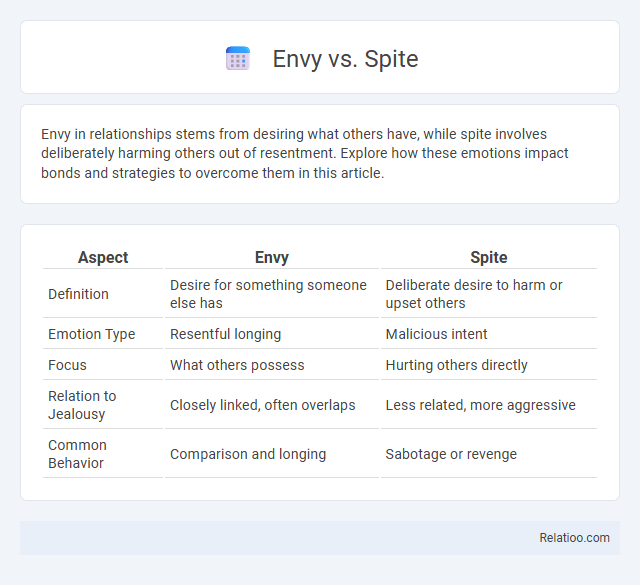Envy in relationships stems from desiring what others have, while spite involves deliberately harming others out of resentment. Explore how these emotions impact bonds and strategies to overcome them in this article.
Table of Comparison
| Aspect | Envy | Spite |
|---|---|---|
| Definition | Desire for something someone else has | Deliberate desire to harm or upset others |
| Emotion Type | Resentful longing | Malicious intent |
| Focus | What others possess | Hurting others directly |
| Relation to Jealousy | Closely linked, often overlaps | Less related, more aggressive |
| Common Behavior | Comparison and longing | Sabotage or revenge |
Understanding Envy: Definition and Origins
Envy is an emotional experience characterized by feelings of discontent and resentment triggered by another person's possessions, qualities, or achievements, often accompanied by a desire to possess them. Originating from social comparison theory, envy arises when individuals perceive themselves as lacking something valued that others possess, which can impact self-esteem and motivation. Differentiated from spite, which involves a deliberate intent to harm others, and jealousy, which typically involves a fear of losing something to a rival, envy specifically centers on longing for what others have.
What is Spite? Key Characteristics
Spite is a malicious feeling or action aimed at causing harm, frustration, or annoyance to others, even at a cost to oneself. Key characteristics include intentionality, self-destructiveness, and a focus on revenge or undermining someone's success rather than personal gain. Unlike envy, which involves desiring what others have, and jealousy, which centers on fear of losing something valued, spite is defined by a desire to hurt or sabotage.
Psychological Roots of Envy and Spite
Envy and spite stem from feelings of inadequacy and social comparison, where envy arises from a desire for someone else's possessions or status, and spite manifests as a deliberate intention to harm others out of resentment. Psychological roots of envy involve low self-esteem and perceived personal deficits, often triggering feelings of inferiority and longing. Spite, closely related, is fueled by malicious motivation to reduce another's success or happiness, driven by anger and a need for revenge rather than mere covetousness.
Envy vs Spite: Core Differences
Envy and spite both stem from negative emotions but differ fundamentally in motivation and expression. Envy involves desiring what another person possesses, often leading to feelings of inferiority or resentment without a direct intent to harm. Spite, however, is characterized by a deliberate desire to hurt or annoy others, sometimes even at a personal cost, reflecting more malicious intent than envy.
Types of Envy: Benign vs Malicious
Benign envy motivates self-improvement and fosters admiration for others' achievements, while malicious envy involves resentment and a desire to undermine the envied person. Benign envy supports personal growth by encouraging goal-setting based on others' successes, contrasting with malicious envy, which can lead to harmful behaviors and social discord. Understanding these types highlights the psychological spectrum of envy, differentiating constructive aspirations from destructive intentions.
Spiteful Behavior: Common Patterns
Spiteful behavior often manifests through deliberate actions intended to harm others, even at personal cost, distinguishing it from envy and jealousy which primarily involve feelings of longing or resentment toward others' advantages. Common patterns of spite include sabotage, spreading rumors, and rejecting offers of reconciliation or cooperation, reflecting a deep desire to see others fail. This behavior can escalate interpersonal conflicts and deteriorate social relationships, highlighting the destructive impact of unchecked spite.
Effects of Envy on Personal Relationships
Envy can significantly damage personal relationships by fostering resentment and trust issues, leading to frequent conflicts and emotional distance. Unlike spite, which involves deliberate harm, envy quietly erodes bonds through jealousy and insecurity. Your ability to recognize and manage envy helps maintain healthier connections and promotes empathy rather than rivalry.
The Impact of Spite on Workplace Dynamics
Spite in the workplace creates a toxic environment by fostering resentment and undermining collaboration, which can severely damage team morale and productivity. Unlike envy, which is a desire for what others have, spite involves intentional actions to harm or disadvantage others, escalating conflicts and reducing trust. Your ability to recognize and address spiteful behavior is crucial for maintaining a positive and effective work culture.
Strategies to Overcome Envy and Spite
Overcoming envy involves cultivating gratitude by regularly acknowledging personal achievements and blessings, which shifts focus away from others' successes. Managing spite requires developing emotional intelligence through mindfulness practices and reframing negative thoughts to promote empathy and reduce resentment. Implementing cognitive-behavioral techniques can effectively dismantle harmful comparisons and foster healthier interpersonal relationships.
Cultivating Positivity: Moving Beyond Negative Emotions
Envy, spite, and jealousy are distinct negative emotions that can hinder your personal growth and relationships. Cultivating positivity involves recognizing these feelings, understanding their impact, and consciously shifting your mindset towards gratitude and self-improvement. By replacing envy and spite with empathy and constructive actions, you foster emotional resilience and a healthier mental state.

Infographic: Envy vs Spite
 relatioo.com
relatioo.com